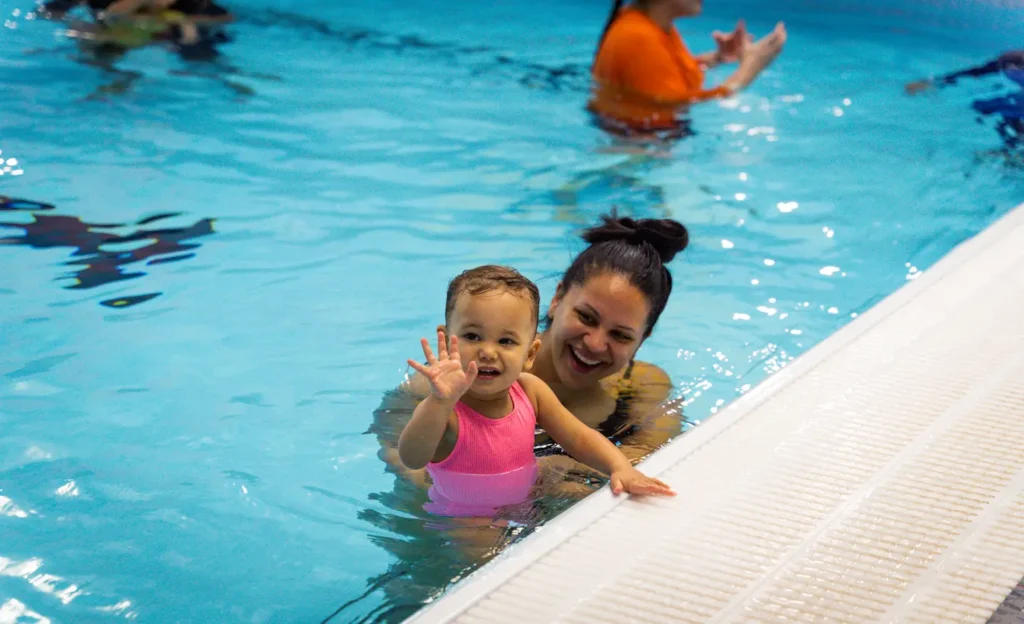In this blog, I’ll tell you all about the benefits of baby swimming. There are many! It’s all about your special time with them and how much you can help them grow and develop in their early months of experiencing the world.
Do babies get a benefit from swimming when they are so young?
Yes! Starting as young as possible gives a baby all sorts of benefits from being in the water. Every young baby works towards developing a range of fundamental movement skills as they grow older. These skills can be transferred into core aquatic skills in the water.
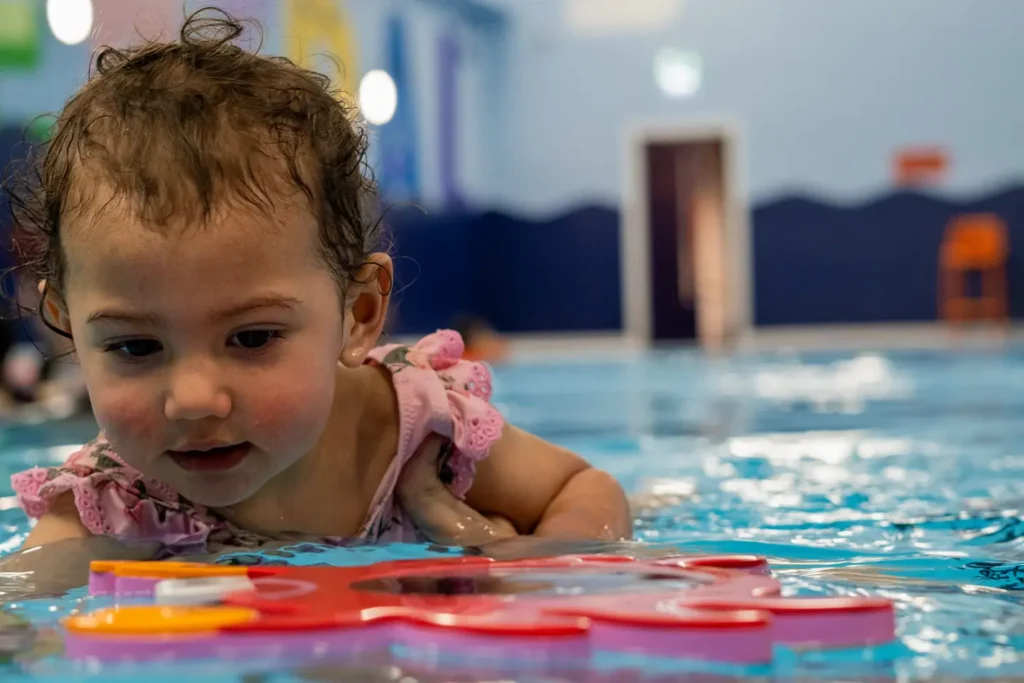
For example, a baby will learn to grasp their toys from around three months old. In the water, they can follow a toy and catch it on top of the water, further developing their hand and eye coordination. Another example is when babies start to roll over onto their tummy. Their core strength and coordination are developing, and that movement can be copied by lying on a floating mat and rolling over, challenging their muscles and building their strength ready to begin learning more movement, for example, crawling.
Adults benefit too
It’s not just babies who gain benefits from swimming, it’s their grown-ups too. Being in the water and moving with your baby is very relaxing. There are no distractions such as other siblings or mobile phones pinging off. You can just enjoy the time you have, letting the buoyancy and soothing nature of water allow you to focus on you and your baby.
Baby swimming is also a gentle exercise for grown-ups, something beneficial to new mums, particularly if they have had a caesarean section. Always make sure you wait six weeks or are properly healed before coming into the swimming pool. Getting advice from your GP is always good practice.
We live in a very cosmopolitan world, and many mums and dads juggle childcare between them. Work commitments can mean the parents share the responsibility of taking their baby swimming. Whoever comes with baby, it is an ideal, one-to-one time that builds a strong bond. This bond is the greatest benefit for both baby and adult—that and making great memories together. Swimming is one of the UK’s best-loved family activities. If baby sees their grown-up enjoying time in the water, that builds water confidence, and they enjoy it too.
Ongoing benefits to babies who swim
The Royal Life Saving Society UK (RLSS UK) reported on a study done at The Griffith University in Southeast Queensland, Australia. They did a three-year study with a group of children where some had taken part in baby swimming and some who hadn’t. They found that by the time the children went to school, those who had taken part in baby swimming would be on average:
- 2 months ahead of their peers in reading
- 11 months ahead in oral expression
- 6 months ahead in mathematics reasoning
- 17 months ahead for story recall
- 20 months ahead for understanding directions
Being physically active gives the 90% of neuron connections that a child develops by the time they’re five years old the best chance possible. Regular exercise also promotes an ongoing, healthy lifestyle and develops good habits.
What are the main benefits of baby swimming?
There are three main areas where a baby benefits from swimming:
- Health benefits
- Physiological benefits
- Psychological/sociological benefits
Let’s look at each in turn.
Health benefits
Babies are learning to master basic movements. By the time a child is two years old, the National Association of Sports and Physical Education recommends that a child gets 30 minutes of structured physical activity (adult-led) and 60 minutes of free play.
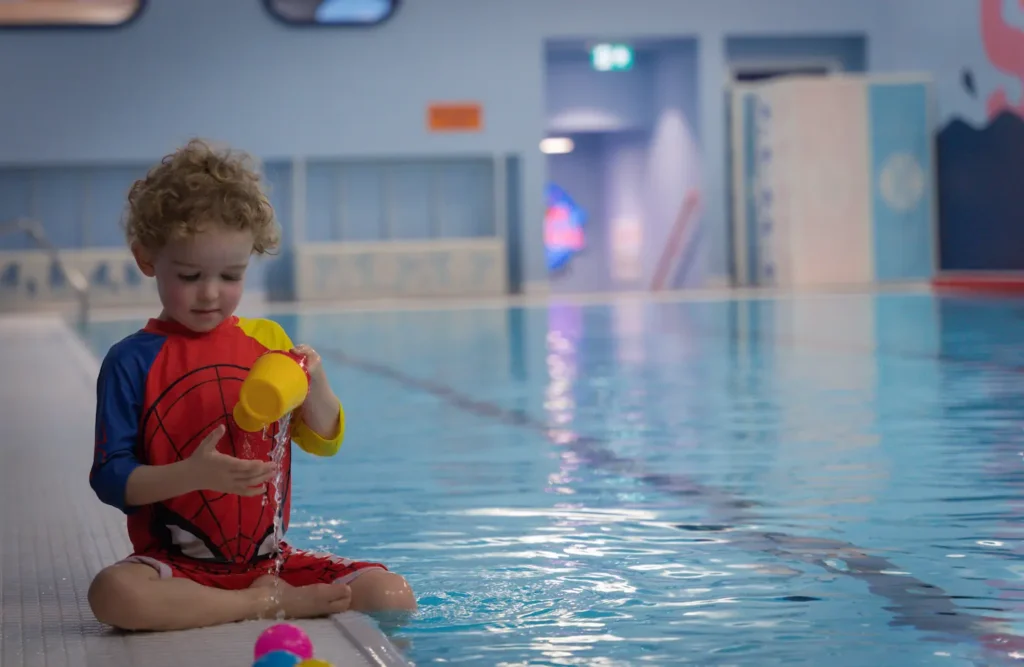
Regular swimming will help a baby’s:
- Cardiovascular system
- Lung capacity and function
- Joint mobility
- Muscles and their function
- Stamina
Babies and toddlers move independently in the water long before they are able to walk or crawl. It helps motor development and develops muscle symmetry. This is why swimming is particularly beneficial for premature babies, as it helps them recapture stages of motor development that they may have missed. Swimming is also a great exercise for babies with disabilities as they can have grown-up support and the buoyancy of the water to help them develop movement and coordination in a calm environment. Babies love gentle exploration.
Physiological benefits
A baby’s general health will be kept stable and will continue to improve, helping their immune system to develop. Their muscles will build up good strength, and their coordination becomes strong and defined.
Like an adult, if a baby exercises regularly then their eating and sleeping improves. You can never start too early with a good lifestyle routine! Some parents also enjoy the after-swimming time where they can put their feet up for a bit as their baby’s nap time can be a few hours!
A baby’s brain is constantly developing and needs to have stimulation to start making all the connections they need as they grow older. Swimming helps to build cognitive function. Problem-solving skills are developed. For example, when a baby starts to understand strong colours, their brains will start to make connections when their grown-up helps them match colours as an activity in the water. Swimming also teaches them how to take risks. Babies fall forward from a mat to start their learning of jumping in. They learn they can take that risk and be OK.
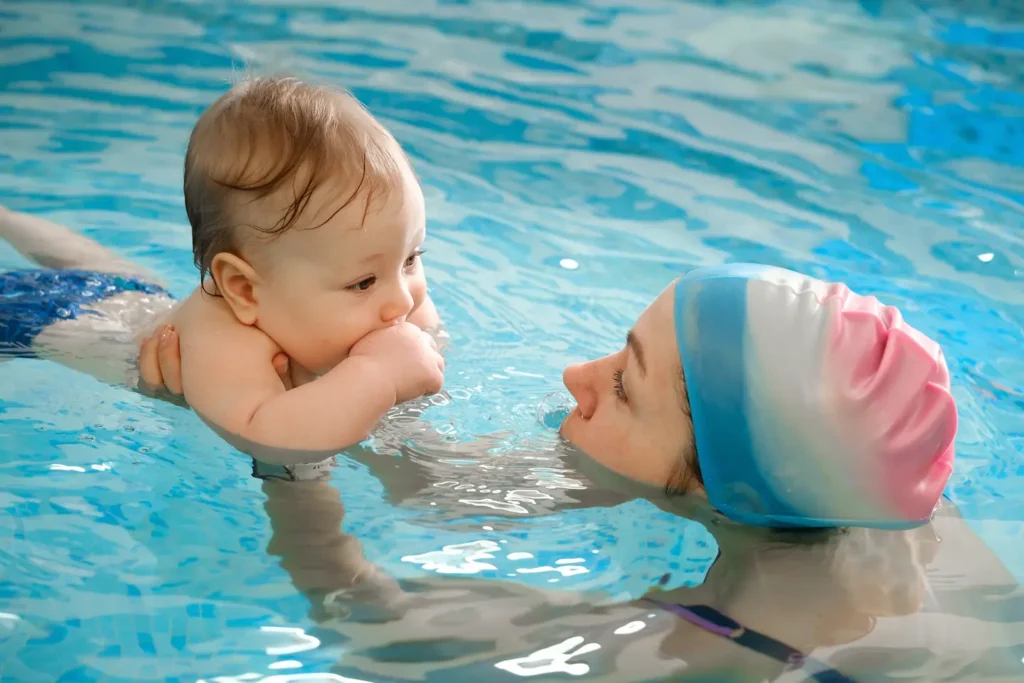
One of the great physiological benefits to swimming is that a baby starts to learn swimming skills. The face planting that they do independently in the water is the start of learning aquatic breathing. Of course, this takes time, but if a baby doesn’t mind putting their head in the water, then they will learn to blow bubbles quicker!
Psychological benefits / sociological benefits
Babies who come swimming from an early age are naturally more confident and curious. Being in a social setting gives the opportunity to develop language and communication skills, and a baby can develop these with other babies or adults in the class.
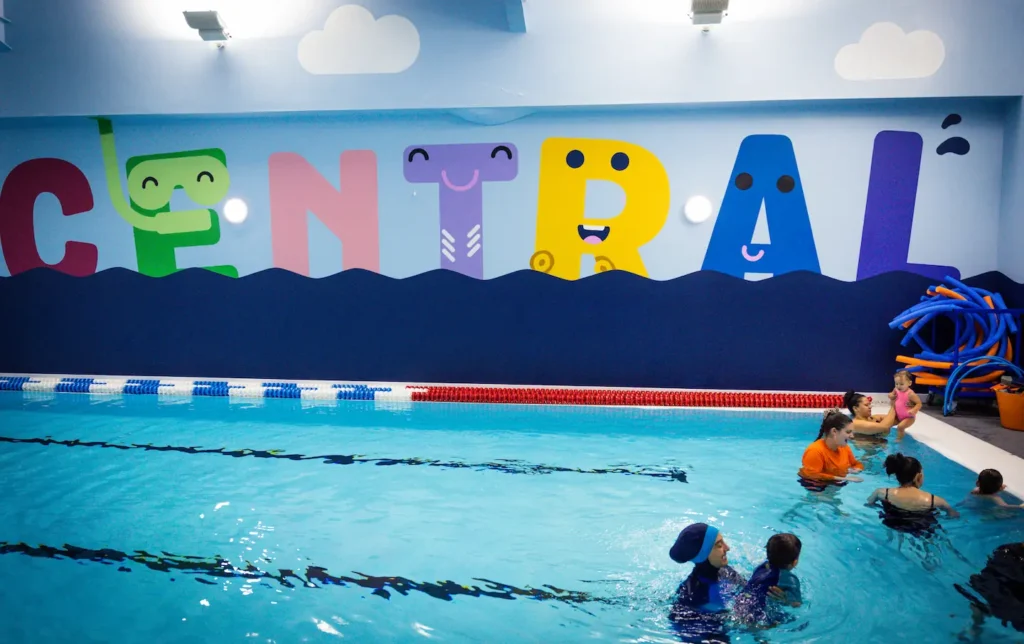
The COVID-19 pandemic, unfortunately, delayed the baby generation of that time from attending activities where they had the opportunity to develop their social interaction skills. Something that has become even more important today. And adults can benefit from meeting new people too who have similar age babies.
Social interaction is important from a young age. Teaching babies to share gives them the opportunity to interact and learn about other human beings and have fun together with the activity they are doing.
In summary
There are many benefits to baby swimming. Health benefits to develop their heart, lungs and muscles. Physiological benefits such as learning basic swimming skills and strengthening their bodies and coordination. Psychological/sociological benefits that provide opportunities to interact with others, have fun playing and learn about being safe in the water.
The greatest benefit is the time you spend with your baby when swimming. A bond is created, you learn together, and you grow confident together. You share things and make memories – some of which may result in a few tales to tell when the baby grows up and takes their own baby swimming!
See if you can find a baby class at Swim Central that suits you. We would love to have you start your swimming journey together with us.

